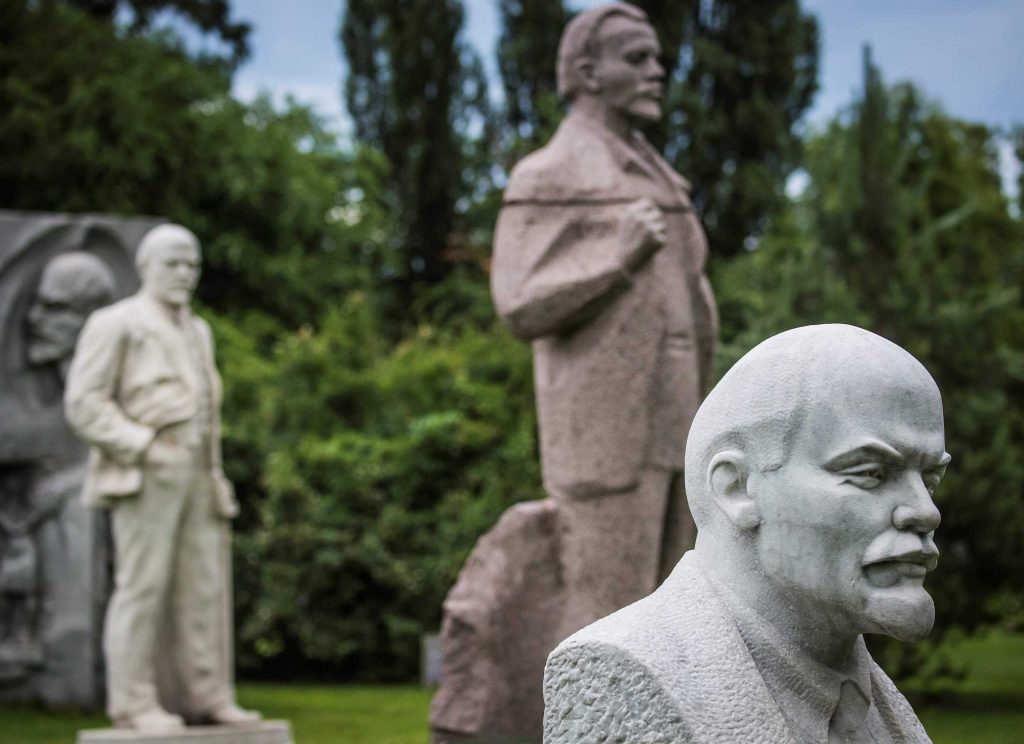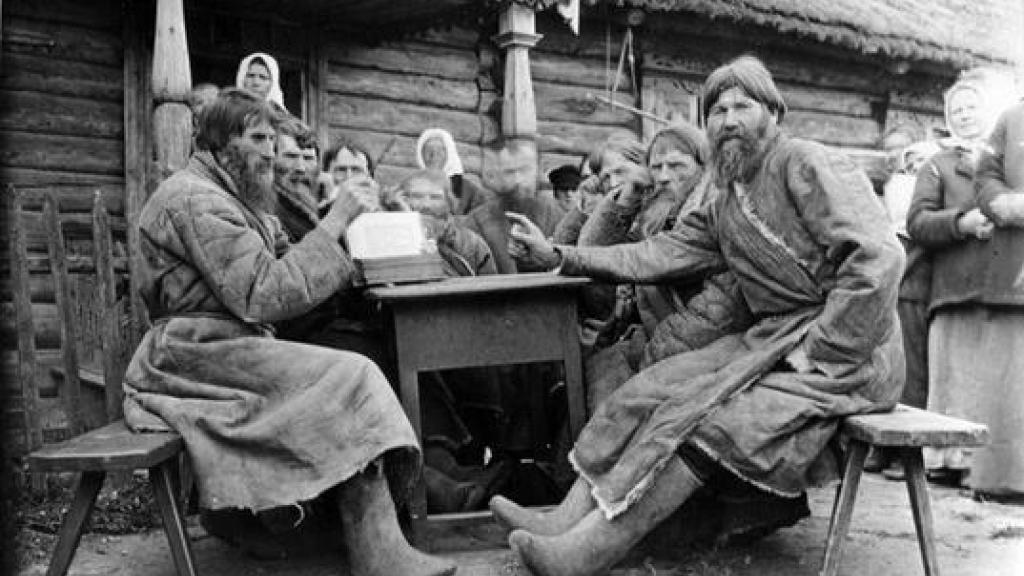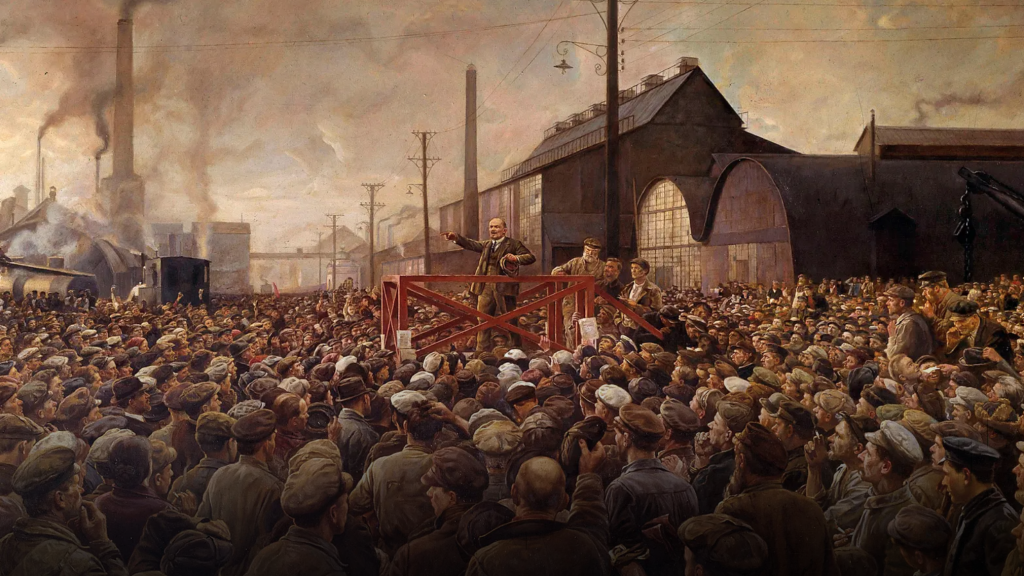

Does the Revolution Eat Its Children?
Nathaniel Flakin and Doug Enaa Greene
An interview with historian Doug Greene about his new book on Stalinism, The Dialectics of Saturn.
Your new book is called The Dialectics of Saturn. There is a picture of Lenin and Stalin on the cover. When I first got my hands on a copy, I wondered, What does Saturn have to do with Stalinism?
The title refers to a quote from the Great French Revolution of 1789: the revolution was devouring its own children like the god Saturn from Greco-Roman mythology. This phrase was uttered both by counterrevolutionary ideologues like Jacques Mallet du Pan and by revolutionaries such as Georges Danton (who was guillotined by the Jacobins). Despite the hopeful and egalitarian beginnings of the French Revolution, it ended with a reign of terror and the transformation of revolutionaries into new oppressors, such as Robespierre and Napoleon. The later detractors of the Russian Revolution saw it undergoing a similar “dialectic of Saturn”: with the rise of Stalinism, the children of the revolution were being eaten. Conservatives, liberals, and reactionaries believed it was written into the stars that all revolutions are destined to follow the “dialectics of Saturn.”
The Italian Marxist scholar Domenico Losurdo used the phrase “dialectic of Saturn” in his book Stalin: The History and Critique of a Black Legend (2008). Losurdo claims that both the French and Russian Revolutions began with universalist and egalitarian visions that inspired the people. Yet the messianic radicalism embodied by Leon Trotsky was unsuited to the construction of socialism. In Losurdo’s view, socialism had to give way to the realism, conservatism, and pragmatism represented by Stalin. Losurdo argues that Trotsky did not understand this requirement of history and was necessarily swept away. He uses the “dialectic of Saturn” to argue that Stalin did not betray the Russian Revolution but was actually its savior. Losurdo himself is part of a long line of figures in the Communist Parties and Western Marxism who believed that Stalinism was historically necessary to reach communism.
There are right- and left-wing positions that use the dialectic of Saturn to explain Stalinism, but the two camps are not so far apart. Both share the same underlying historical fatalism: Stalinism was the inevitable result of the Russian Revolution, and no alternatives were possible. There is, however, another position, one that rejects this “unity of opposites”: Trotsky’s theory of “proletarian Jacobinism.” Like all other Bolsheviks, Trotsky saw the Russian Revolution through the prism of its French precursor, which provided historical examples to both emulate and avoid. Trotsky used this approach to develop an alternative program to the bureaucratization of the Soviet Union and to understand the material conditions that led to the rise of Stalinism. He concluded that there is no mystical “dialectic of Saturn.” Above all, he showed that Stalinism was historically unnecessary to reach communism.
It’s almost “common sense” to say that the Russian Revolution led directly to Stalinism. Defenders of bourgeois society claim that every violent revolution is only going to lead to more violence. Now. I know you just wrote a whole book on the topic, but can you very briefly explain where Stalinism came from?
First, we should provide a brief definition of Stalinism. It is the rule of a bureaucracy over collective property relations that were originally meant to produce proletarian democracy. The reigning ideology of Stalinism was the theory of “socialism in one country.” This national parochialism stood in stark contrast to the proletarian internationalism of Bolshevism in Lenin’s time. In fact, Stalinism represented the antithesis of Leninist communism.
Second, Stalinism was a result of the concrete material conditions stemming from the isolation of the Russian Revolution. Russia suffered from economic underdevelopment, the decimation of the working class during the civil war, and the atrophy of the workers’ councils, i.e., the soviets. In this political void, the Soviet bureaucracy centered around Stalin managed to solidify its rule. After taking power, the Stalinists purged, imprisoned, and murdered many of the best communist militants of the Russian Revolution. This counterrevolutionary process was vividly described in Trotsky’s magisterial work The Revolution Betrayed.
Contrary to conservative or social democratic claims, Stalinism was not the fulfillment of Bolshevism. It was a betrayal of its commitments to workers’ power and international revolution.
Stalin’s rule was so terrible — purges, gulags, mass deportations, and shameless distortions of the truth — that some socialists say it was just another form of capitalism. How would you respond to that?
As the Belgian Marxist Ernest Mandel who once said, many communists look at everything that was wrong with the USSR and want to condemn it as the worst thing we can think of: capitalism. This is perhaps understandable, since there is much about the Stalinist-era USSR that has little to do with socialism. Yet if we look soberly at the USSR, we can see that these “new class” theories do not illuminate how it functioned.
Take the example of Tony Cliff, a leader of the International Socialist Tendency, who argued that the USSR became state capitalist circa 1928. Cliff believed that the USSR underwent rapid industrialization and capital accumulation to establish itself as a military power to compete with imperialism. He saw the USSR as essentially one big factory that was compelled to accumulate and match its productivity levels to that of its rivals, like any other capitalist business.
There are several problems with Cliff’s analysis. First, the political and economic structure of the USSR was largely the same before and after 1928. This state capitalist counterrevolution is supposed to have occurred without any fundamental change in how the society functioned. Cliff’s theory cannot explain how ownership relations were suddenly overthrown, which he pictures as happening like a thief in the night. Second, the USSR lacked key features of capitalism: there was no generalized commodity production, labor was not bought and sold like a commodity, and the social surplus was not appropriated by the capitalists for profit. It is true that the law of value existed in the USSR, but it was not dominant in society; it was constrained by the state and the planned economy. Third, the central plan did not operate according to the imperatives of profit, and it avoided the periodic crises that characterized capitalism. Fourth, the bureaucracy lacked many of the attributes of other ruling classes: they were unnecessary to the productive process but parasitic upon it. The bureaucrats did not own the means of production, and they could not transmit property to their children. Finally, if the USSR was already capitalist in 1928, then what happened to its economy in 1991? Did the country just go from capitalism to capitalism?
Whether this “new class” approach uses the labels of “state capitalism,” (Tony Cliff), “bureaucratic collectivism” (Max Shachtman), or “social imperialism” (Maoists), it is always rooted in subjective moralism, surface-level empiricism, and extreme voluntarism. None of these versions of they theory can scientifically grasp the USSR’s genuine laws of motion that occurred due to the contradiction that existed between its nationalized economy and the bureaucratic caste. Moreover, many of these new class theories capitulate to right-wing anticommunism by arguing that the USSR was objectively worse than imperialism.
After Stalin’s death in 1953, there was a certain liberalization in the Soviet Union: political prisoners were released, and the mass murders ended. Some thinkers from the Trotskyist movement, such as Isaac Deutscher, thought this meant that the Stalinist states could finally start moving toward socialism. Why didn’t this happen?
Deutscher believed that democratization should’ve come from the Trotskyist opposition, but they were largely wiped out as a coherent and organized force during the Great Terror. As a result, the only conceivable force for de-Stalinization could not come from below but from above, inside the Communist Party. This is what happened after Stalin’s death with Khrushchev’s Secret Speech. While Khrushchev’s reforms ended mass terror and allowed for more liberalization, there were always limits to how far he was willing to go. For example, Khrushchev said all the crimes of Stalinism came from the “cult of personality,” but he nonetheless defended Stalin’s campaigns against oppositionists. He condemned only Stalin for turning against fellow comrades, absolving party bureaucrats of any complicity. This allowed him to preserve the legitimacy of the Soviet bureaucracy while blaming everything bad on Stalin.
The Secret Speech failed to account for the material conditions that allowed Stalinism to emerge. To do otherwise could raise dangerous challenges to the whole system of bureaucratic rule, and this was something Khrushchev was unwilling to do. While Khrushchev and other reformers in the Eastern bloc were willing to end the most egregious practices of Stalinism, they were unwilling to do anything that would endanger their bureaucratic privileges. When reforms went too far and led to mass upheaval in both Hungary in 1956 and Czechoslovakia in 1968, the USSR sent in tanks to crush them. In the end, bureaucratic self-reform always had a built-in limitation: the reformers tried to maintain the overall system without involving the masses from below, since that could bring down the whole apparatus.
Today, there are very few Stalinist states left. But Stalinism still divides the Left. Why is this debate still relevant? Some socialists say we should move on.
To start, I would not discount the People’s Republic of China, where the Communist Party still claims to be following Marxism-Leninism. This matters because China is the most populous country in the world, with a massive economy. Therefore, it remains important to pay attention to China and its impact on contemporary understandings of socialism. Beyond that, there are non-ruling Communist Parties that claim allegiance to Marxism-Leninism, i.e., Stalinism. In Chile, Portugal, South Africa, Greece, India, and Japan, these parties are not sects but genuine mass organizations. So it is worth paying attention to Stalinism, since it is still a significant force on the broad left.
There is, however, another reason to pay attention to Stalinism in contemporary debates on socialism. Even though the USSR is gone, it casts a long shadow on any discussion on the nature of socialism. Well-meaning people who are interested in an alternative to capitalism will ask Marxists, Won’t socialism just end in Stalinist terror? It is imperative to answer that question. Even after wiping away all the anticommunist distortions about the Soviet past, we should be able to explain how Stalinism’s crimes are not those of socialism. In other words, Stalin’s record is something communists must explain — rationally and accurately — but I don’t think we need to own him or his crimes.
Every once in a while, you will see an online Stalinist defending the unhinged conspiracy theories behind the purges. They will claim that anti-Stalinist communists like Trotsky were collaborating with the Nazis. How would you respond to this?
To start, there was the sectarianism of the Communist International’s third period line in Germany. The Communist Party labeled the Social Democrats “social fascists,” saving their vitriol for them rather than the Nazis. This not only left the Nazis alone as they gained in power and strength, but also alienated workers who still had faith in the SPD. The alternative, as Trotsky argued, would have been trying to win them over to a united front against fascism. The third period line may not have directly led to Hitler’s rise to power, but it did next to nothing to stop it. The Comintern leadership under Stalin should bear its share of responsibility for the disaster in Germany.
Many arguments favoring Stalin’s historical necessity claim that his policies industrialized the USSR and led the country to militarily defeat Nazi Germany in World War II. But the experience of the Molotov-Ribbentrop Pact of 1939–41 undermines many of those claims. For one, the USSR collaborated with the Third Reich in dividing up Poland and Eastern Europe between them. This was supposedly to create a buffer zone for the Soviet Union and buy time before an eventual war. Yet the USSR provided vital raw materials to the Nazi war machine. While Germany benefited from this trade, Hitler did not want to remain beholden to Stalin and believed he could gain even more resources by conquering the Soviet Union. Stalin honored those trade agreements even as the Third Reich was massing its troops on the border. In one grotesque act of collaboration, Stalin sent several hundred German and Austrian anti-fascists living in Soviet exile back to the Third Reich, even though there was no provision in the pact for a prisoner exchange. This was viewed as a “gift” by the USSR to Germany. Despite all this collaboration under the pact, the world’s Communist Parties were compelled to defend the Soviet agreement with their avowed fascist enemies.
Furthermore, the pact did not buy needed time for the USSR to prepare for war. Stalin expected a long war in the West, and Hitler basically defeated France in six weeks. This meant that war with the USSR was on the near horizon. To maintain the pact and appease Hitler, Stalin willfully ignored intelligence reports about an imminent German invasion. The Red Army was also out of position, when the Germans attacked and many of its best commanders, such as Mikhail Tukhachevsky, had been killed in the military purges. As a result, the Germans achieved some stunning victories when their soldiers invaded the USSR. We can conclude that Soviet collaboration with Nazi Germany did a great deal to discredit socialism and nearly doomed the USSR in 1941.
The most unhinged conspiracist theorist of them all is a medieval literature professor named Grover Furr who claims to have discovered evidence that all of Stalin’s accusations were true. You are probably one of very few serious historians to have read Furr. What is his argument?
Furr has spent several decades defending Stalin, stating in 2012, “I have yet to find one crime — yet to find one crime — that Stalin committed. … I know they all say he killed 20, 30, 40 million people — it is bullshit.” His most well-known book is Khrushchev Lied (2011), in which he argues that the Secret Speech is a complete fabrication and a rehashing of bourgeois and “Trotskyite” lies.
Throughout Furr’s writings, he argues that the Moscow Trials of the 1930s were not frame-ups but that the defendants were guilty of collaborating with foreign powers. He uses hearsay, half-truths, and rumors to bolster his case since there is no documentary evidence. The only “evidence” that Furr can rely on is the confessions of the defendants at the Moscow Trials. According to Furr, the defendants were telling the truth when they confessed, and no torture was involved. Yet we know that the USSR routinely practiced various forms of coercion to extract confessions that included physical torture and threatening the victims’ families. For example, the signed confession of Mikhail Tukhachevsky was covered in bloodstains. Furr thinks these might have come from a pricked finger and not a beating. In other words, Furr’s justification for the Moscow Trials is based on leaps of logic and pure fiction.
In addition, Furr claims that Khrushchev could take power owing to underlying historical and ideological weaknesses in the USSR. He says that these weaknesses were inherent in the idea of a transitional socialist stage itself. Since Soviet socialism contained material inequality, privileges, and wage differentials, it did not lead to communism but back to capitalism. Furr concludes by rejecting socialism and stating that society must go straight to communism by immediately abolishing money, markets, and inequality. On the surface, it may seem paradoxical that Furr justifies Stalin’s repression alongside a quasi-anarchist rejection of socialism. But these positions naturally go together since implementing sweeping changes right away would require massive force. The implication is that the people cannot reach communism on their own, but it must be beaten into them. This is why Furr celebrates Stalin’s use of state power and police repression, since it showed the type of ruthlessness needed to achieve communism.
In the end, Furr acts as a Stalinist Jesuit who gives the appearance of rigorous research and documentation by fiercely defending the faith from all heretics. For Furr, the old orthodoxy on Stalin must be upheld at all costs. Anyone who questions its catechisms is automatically viewed as an anticommunist enemy. His approach is deceptive to many new audiences who don’t have much background, and it appeals to Stalinist dogmatists who want someone to “prove” their faith. This is not to say, however, that Furr has no useful attributes. If we want to do a serious historical materialist analysis of the USSR and Stalin, then Furr’s work serves as a magnificent example of what not to do.
Your book has been published by an academic publisher, and it is rather expensive. How can people get a copy?
Please help generate support for a paperback version by asking your library to order a copy, writing reviews, doing interviews, and writing to the publisher. Thanks for your support!
Douglas Greene, foreword by Harrison Fluss, Stalinism and the Dialectics of Saturn: Anticommunism, Marxism, and the Fate of the Soviet Union (Lanham, MD: Lexington Books, 2023), 402 pages, $125 / $50.

Nathaniel Flakin
Nathaniel is a freelance journalist and historian from Berlin. He is on the editorial board of Left Voice and our German sister site Klasse Gegen Klasse. Nathaniel, also known by the nickname Wladek, has written a biography of Martin Monath, a Trotskyist resistance fighter in France during World War II, which has appeared in German, in English, and in French. He is on the autism spectrum.

Doug Enaa Greene
Doug is an independent communist historian from the Boston area. He has written biographies of the communist insurgent Louis Auguste Blanqui and DSA founder Michael Harrington. His forthcoming book, The Dialectics of Saturn, examines Marxist debates about Stalinism.

